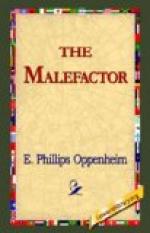“I am afraid,” he said, “that none of what we call the careers are open to you. You could not enter Parliament, and you are too old for the professions. The services, of course, are impossible. You might write, if your tastes ran that way. Nowadays, it seems to be the fashion to record one’s experiences in print, if—if they should happen to be in any way exceptional. I can think of nothing else!”
“I am very much obliged to you,” Wingrave said. “Your suggestions are eminently practical. I will think them over. Don’t let me keep you any longer!”
“About this evening,” Rocke remarked. “Shall I fix up that little dinner party? You have only to say the word!”
“I am very much obliged to you, but I think not,” answered Wingrave. “I will dine with you alone some evening, with pleasure! Not just as present!”
Rocke looked, as he felt, puzzled. He honestly wished to be of service to this man, but he was at a loss to know what further suggestion he could make. There was something impenetrable about his client, something which he could not arrive at, behind the hard, grim face and measured words. He could not even guess as to what the man’s hopes or intentions were. Eventually, although with some reluctance, he took up his hat.
“Well, Sir Wingrave,” he said, “if there is really nothing I can do for you, I will go. If you should change your mind, you have only to telephone. You can command me at any time. I am only anxious to be of service to you.”
“You have already been of service to me,” Wingrave answered quietly. “You have spoken the truth! You have helped me to realize my position more exactly. Will you give your father my compliments and thanks, and say that I am entirely satisfied with the firm’s conduct of affairs during my—absence?”
Rocke nodded.
“Certainly,” he said. “That will please the governor! I must be off now. I hope you’ll soon be feeling quite yourself again, Sir Wingrave! It must seem a bit odd at first, I suppose, but it will wear off all right. What you want, after all, is society. Much better let me arrange that little dinner for tonight!”
Wingrave shook his head.
“Later on, perhaps,” he answered. “Good morning!”
A STUDENT OF CHARACTER
Left alone, Wingrave walked for several minutes up and down the room, his hands behind him, his head bent. He walked, not restlessly, but with measured footsteps. His mind was fixed steadfastly upon the one immediate problem of his own future. His interview with Rocke had unsettled—to a certain extent unnerved—him. Was this freedom for which he had longed so passionately, this return into civilized life, to mean simply the exchange of an iron-barred cell for a palace whose outer gates were as hopelessly locked, even though the key was of gold! Freedom! Was it after all an illusion? Was his to be the hog’s




